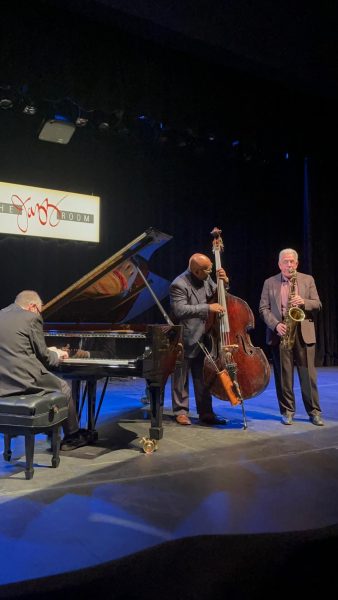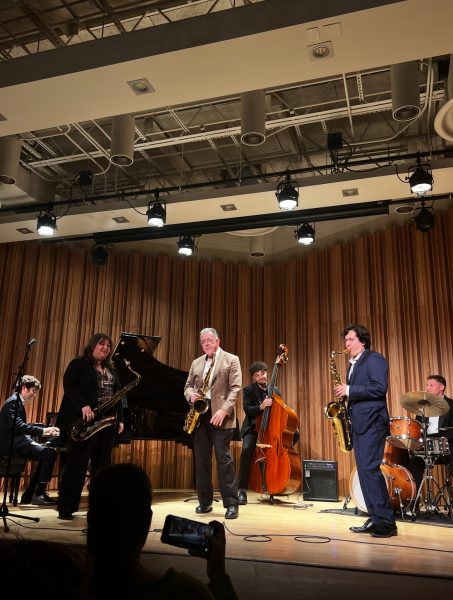In a vastly different era of the William Paterson Music Department —precisely 26 years ago — Jazz Studies Coordinator Dr. David Demsey said in an article for The Beacon that “the best teachers are the people who don’t draw a line between classical and jazz, music and life.” As he retires this spring after 33 years at William Paterson, the student body and surrounding community are preparing to remember him by the very quality he described, years later.
“You’re in a job this long and there’s just the tendency to become the job … sometimes there is no separation of identity between me and the jazz program,” Demsey said.
His description is no exaggeration. As jazz studies coordinator, Demsey oversees more than 80 students in the highly competitive jazz program. In addition to advising, outreach, teaching, and conducting the William Paterson Jazz Orchestra, Demsey also curates the Living Jazz Archive housed in the Cheng Library.
In 2004, when trumpeter Clark Terry was giving an interview in the Shea Center, he surprised audience members, including Demsey, when he announced that he wanted his jazz keepsakes to be archived on campus. Just like that, it became Demsey’s responsibility to make everything happen, which he didn’t hesitate for a moment to accept. Besides writing the jazz studies master’s degree, the formation of the increasingly sizable Living Jazz Archive is one of his most notable contributions to William Paterson University’s campus.
“We worked for ten years on that … I am the luckiest guy ever, having known and interacted and taught with people at this level.”
Coinciding with his fondness for Terry’s “life-changing” request, Demsey defines his different eras as coordinator by whichever jazz studies director he was running the program with. Past directors include bassist Rufus Reid and pianists James Williams and Mulgrew Miller. Pianist Bill Charlap is the current director, taking the position in 2015.
For Demsey, “those are the eras because each of those people were so beautiful and so unique, and they had their own stamp on this program.”
Now, with his retirement approaching, colleagues and students who interact with Demsey daily have taken the time to reflect on what the “Demsey era” has meant to them, citing his stamp on the program.
“My admiration for Dr. David Demsey is beyond measure. He is a master musician, a virtuoso saxophonist, a brilliant conductor, and an inspiring leader of the William Paterson Jazz Orchestra. He has been a vital force in jazz education at William Paterson University for 33 years. Dr. Demsey has always been generous with his time and counsel and treats every student and colleague with great respect. He leaves William Paterson University with a deep legacy that will always be treasured,” Charlap said.
As Charlap notes, Demsey is a masterful saxophonist. Like the enthusiastic students, Demsey, too, is subject to the desire to play with the jazz legends who visit the Shea Center every semester. But to Demsey, his role as an educator comes first, for he feels that a spotlight on his performing abilities would be “double-dipping.”
“I’m never there as a saxophonist. I’m there as a producer, I’m there for the audience, and I’m there for the students. I’m not there to go sit-in,” Demsey said. “But if they want me to do it, I’ll do it.”
And students, faculty, and community members alike do want him to do it. At the Jazz Room concert on April 27, which featured Charlap and bassist Christian McBride, Demsey walked on stage to a standing ovation and joined them for a moving rendition of “Body and Soul” to finish out the concert.

Undoubtedly, seeing a musically talented educator is inspiring to students who are still figuring out where their love of jazz will take them. Junior performance major and saxophonist Sydney Mecca greatly values seeing the musician side of Demsey, and convinced him to play with her on stage last semester, too.
Mecca said, “Dr. Demsey is one of the greatest individuals I have ever had the pleasure to get to know. When I got accepted into William Paterson, he was the first person to call me and inform me of my acceptance. I know no other jazz coordinator who would call his upcoming freshmen class to personally talk to them. Ever since choosing William Paterson, Dr. Demsey has done nothing but show me kindness, challenge my knowledge of music, and encourage me to grow as a musician and individual. Most of all, Dr. Demsey truly believes in me. I have never felt more supported musically than from Dr. Demsey. He has helped me navigate playing the saxophone and has gone above and beyond to educate me on gear and ensure I have the resources I need to succeed. He has helped me in times of hardship and has guided me through every decision I have made regarding my education. He is not just a coordinator of this program, but rather a dear family member. He is invested in the student body. So much so, he happily played a tune with my ‘Boss Tenors’ concept group during our common hour performance last semester. Although I am saddened to see Dr. Demsey physically leave this program, I will always cherish the time I have spent with him during my time here and the everlasting impact he has had on my education, career, and life.”

Mecca is not the only student to have experienced numerous bold efforts made by Demsey that prove his unwavering determination to make all students feel seen and cared for. Nathan Renson, a sophomore saxophonist who transferred to William Paterson after the shocking closure of the University of Arts in Philadelphia, shared his unique perspective on what Demsey has meant to him.
“After the closure of UArts, I thought I had no options as to what came next, or if I’d even get to continue my education. I contacted Dr. Demsey in July as a last-ditch effort to find somewhere willing to take me in. Despite most deadlines regarding enrollment being closed already, without any hesitation at all, Dr. Demsey got to work devising a plan allowing me to be welcomed into this world-class jazz program. Because of his swift action and determination, I can spend the rest of my collegiate career in this amazing department. He continues to lend a helping hand whenever possible and has been a true lifesaver to me and all of my peers. He has a way of making each one of us feel like we’re the only one he’s taking care of. I am going to miss his presence in Shea enormously, and I am forever grateful for all that he has done for me in the past year,” Renson said.
Although getting to work with countless jazz legends over the years is certainly a plus, for Demsey, what has kept him at William Paterson for 33 years is working with such uniquely determined students.
“On one level, my mind just wants to stay here forever because I get to work with students at this level … for every student in here, I know exactly what I can have them play that everybody’s gonna go, ‘This is the best student anywhere!’ And I know what I could have them play where people would go, ‘Well, they kind of need work,’” Demsey said.
Demsey leaves the students with a substantial piece of advice: “The point is to help (yourself); you’ve got to reinforce it by playing what you’re strong at, but at the same time, (it’s like professor) Charlap’s saying — ‘run towards the cannons.’ In other words, if the enemy’s there, run there … if there’s something you can’t do, practice that. Don’t just practice what you can do.”
Ultimately, Demsey leaves a lasting influence on not only the William Paterson music community but also the wider jazz legacy. Next year, he will be working closely with his successor, Dr. Mitch Butler, to ensure a smooth transition into a new era of the William Paterson jazz program, which he is confident will continue to thrive as it has.
When asked what it feels like to retire, Demsey said, “I don’t feel any different. The energy of this building — not the building, the energy of you, the energy of the students, that’s what (hasn’t changed). Nothing has changed.”
Come his departure, he hopes for the energy to remain this way. With the hard work he continues to put in, it will.
douglas weiss • Jul 18, 2025 at 9:09 am
Bravo Dr. Dempsey, on a job well done.
Kyra Cioffi • May 2, 2025 at 3:03 pm
Great piece Shyla —Kyra